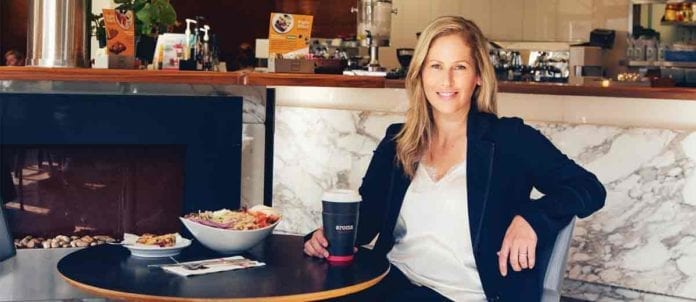When Anat Davidzon was a student working toward her computer-science degree in Jerusalem, she would feed the effort with salads and sandwiches from a local coffee shop whose prepared-onsite cuisine she couldn’t resist. When she moved to Toronto to start on an MBA, she couldn’t bear the thought of leaving her discovery behind, so she decided to bring the shop with her.
Aroma Espresso Bar — this year’s pick for F&H’s Regional Company of the Year — is an original purveyor of the twin fuels of modern life: coffee and good-for-you eats. Its Ontario locations (44 by the end of 2017), the majority of which are in the GTA, are bustling tributes to the stylish success story Davidzon — who co-owns the brand’s Canadian rights with Toronto financier Earl Gorman — and her team have cultivated for this Israeli organization’s overseas outpost.
Ten years after Aroma opened its first Canadian location in Toronto’s Annex neighbourhood, Davidzon has just put the finishing touches on its 40th, in a bustling, bright, very urban corner-pocket in the shadow of the CN Tower, just this side of the Air Canada Centre. A gleaming stone floor offsets exposed ducts and brick walls adorned with framed food photos. At the front counter, a display case brims with bloated bureka and delicate alfajores — the famous caramel-cookie sandwiches from Peru. Customers here are a mixed bag, many having wandered in from a FanFest across the street, complete with superhero bodysuits and alien ears. But there are also families helping children tuck into fig-and-goat-cheese croissants and lentil soup, and road warriors reconciling laptops with fist-sized date pastries.
Aroma’s wide-ranging Mediterranean-inspired menu has many highlights, including salads made with ancient grains most Canadians have yet to discover and sandwiches made with bread baked fresh onsite every day. Davidzon likes to tell a story about quinoa, and how, when Aroma introduced this now-pervasive rice alternative in 2008, she’d keep a bowl of it beside her at the counter, so she could educate customers on its unfamiliar marvels. It was the same with kale, she says, and now with freekeh, an ingredient newcomer poised to be the next supergrain. “As a company, you need to have an innovative mindset,” she says of taking the lead on such novelties. “It’s got to be part of your values.” Along with bread, a raft of eclectic pastries (think Greek yogurt cherry danish and coconut-orange cake) are baked in the kitchen and everything is made-to-order — another distinction that separates Aroma significantly from its coffee-shop competitors, where food is wrapped in cellophane or has been sitting in a chilled plastic container for a day.
Davidzon also decries the lack of ambiance on offer at many coffee shops. “I’d get a coffee and a sandwich and sit in the parking lot,” she remembers of her early Toronto coffee-drinking experience. It’s why she invested serious time and effort in her stores’ “modern look, slick design, comfortable seating and music.” Ten of the locations are licensed, with wine, beer and a Signatures drink menu with hot and cold drinks that can be spiked.
Taken as a whole, these characteristics make up the “Aroma twist,” an approach to foodservice embraced by Aroma disciples that promises the unexpected. It’s including a hard-boiled egg on the avocado sandwich, for one. Or topping Moroccan-spiced chicken, black quinoa and brown rice with tahini yogurt (house-made, of course). At its heart, says manager of Marketing and Communications, Daniel Davidzon, the Aroma twist is applying techniques and ingredients that aren’t as common in North America as in Europe and the Middle East to foods from here.
And then there’s the coffee, which isn’t just a critical ingredient in Aroma’s success, but a potential impediment to it. On the one hand, admits Daniel, the company struggled with the limitations the name imposed on the brand for the whiff it gave of being a coffee shop only. (A desire to, instead, showcase customers “eating huge salads out of ceramic bowls with real utensils” is what informs a franchise-design tenet that forbids papering the windows with posters.) The food-oblivious moniker, shrugs Davidzon, simply means “you have to invest a lot more resources in explaining what it is that you do.”
On the other hand, says David Hopkins, president of restaurant consultancy The Fifteen Group, the coffee element of Aroma is at risk of being diminished by the company’s passionate emphasis on food. “Maybe they’ve got a huge coffee following that I don’t know about, but I know a lot of people who go to Aroma and it’s not for the coffee.” Ultimately, Aroma vies for consumer attention from both coffee shops and healthy-food purveyors, equally. Such extensive competition presents a tall order, says Davidzon, who admits to “waking at three every morning thinking about [my] challenges,” because Aroma has to tackle all the aspects of its competitors’ operations under one roof. “I have to train Jay to make the salad in this location and Tim to make the same salad in another.” The trick to ensuring that consistency, she says, is identifying qualified owner-operated franchisees, giving them tools and training, and making them feel part of a family. When Semion Merzon opened his 1,500-sq.-ft. Aroma franchise in Niagara-on-the-Lake, Ont. in mid-2014, Davidzon, who was pregnant with her first child, came to the store on opening day to help. “She drove from Toronto, ran around the kitchen all day and worked shoulder to shoulder with me,” Merzon says. “She didn’t have to do that; there are a million other people she could’ve sent. It helped me a lot. I don’t know how it is with other franchises, but I wonder whether they have this connection.”
Davidzon hastens to qualify Aroma’s competition as both double-barrelled and non-existent. After all, there was a yawning absence of the type of concept Aroma loosed on the market when it launched in 2007 — places where you could get high-quality espresso-based coffees and tasty, fresh-food offerings that went beyond a bagel and cream cheese. And it’s this combination, she contends, that continues to distinguish Aroma from almost everything else out there.
“Outside of a few indie shops, it’s very difficult to find a full-service Italian espresso-bar experience where you can also have fresh, hearty food that’s made to order,” says Daniel, who is Anat’s cousin and joined Aroma in 2014. “You can go into Freshii and get an amazing bowl, but you’re not getting coffee there. Or you can go into Starbucks and have an amazing coffee, but your sandwich will be wrapped in plastic.” You bet, agrees Hopkins. “I can’t think of a concept that offers quality coffee as well as that level of quality of food offerings. They’re well set up for success because of that.”
Still, Daniel acknowledges the landscape has changed since Aroma made Canadian landfall. “Now there are so many healthy-food places offering variations of the same thing that people can choose from. We’re aware of that.” But, he says, the company considers competition good for business because it ensures Aroma is on its toes.
He points to the bowl trend and how Aroma sought to raise the bar with its Moroccan-Spiced Chicken and Grain Bowl, introduced as a temporary holiday item last year, but kept on in response to “phenomenal feedback.”
Supporting the communities in which it operates has always been a key tenet of Aroma Espresso Bar, partnering with such diverse organizations as Children’s Aid Foundation, Unity for Autism, Baycrest, Women’s Brain Health Initiative, Lymphoma Canada, Lean In Canada, Mount Sinai Foundation and more.
As for future growth, Aroma will continue to cultivate its growing catering program and “strategically open new locations in areas where we feel it will meet the customers’ needs.” The company is planning its first Vancouver store in 2018. But equally important to expansion is ensuring the current locations flourish inside the standards of the brand. “You have to create processes — and to execute, monitor and enforce them,” says Davidzon. “If you don’t, quality will be affected.”
“We’re not done. There’s a lot more to do. People are more educated and they travel more. They care more about what they consume than they did 10 years ago. Whether or not we created that trend, it’s the reality. I hope we’re part of that. I hope that people get inspired by Aroma.”
Volume 50, Number 8
Written by Laura Pratt


















